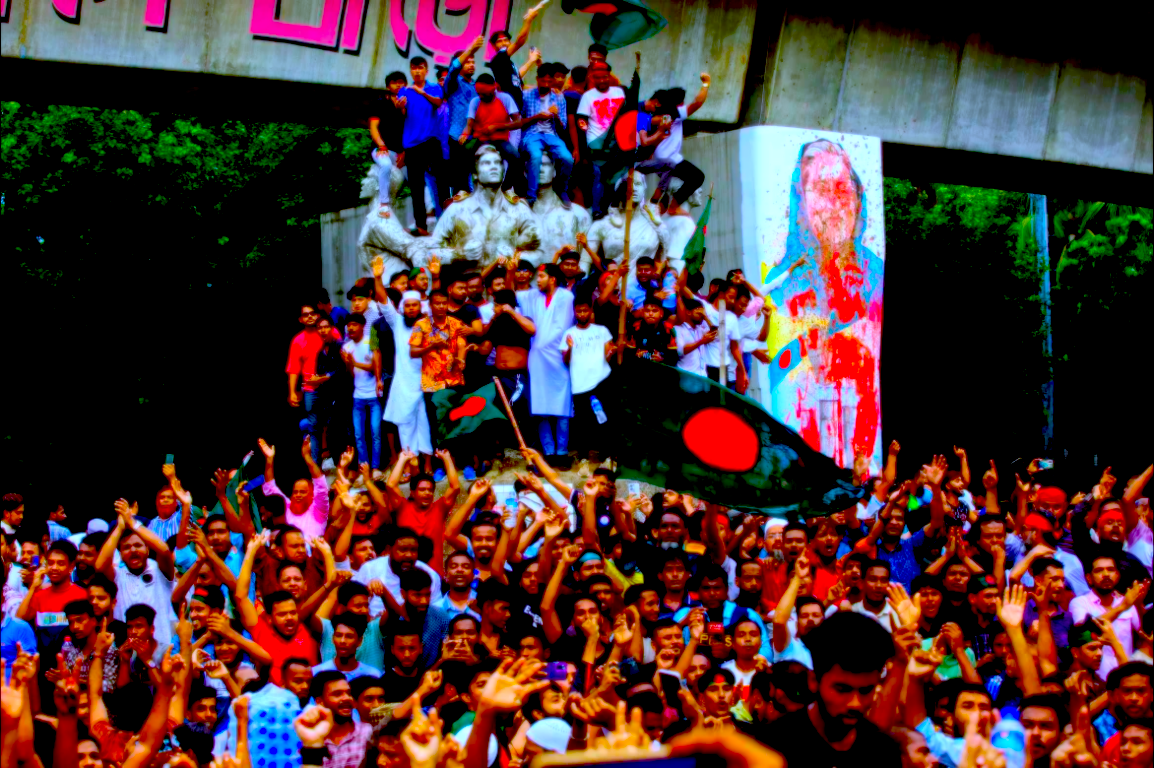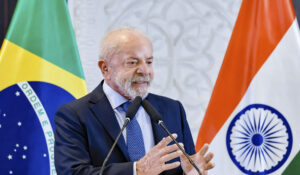
Published 05/08/2024 13:58 | Edited 05/08/2024 14:14
Bangladesh Prime Minister Sheikh Hasina resigned and fled the country on Monday (5), the Armed Forces command announced, after weeks of intense protests that resulted in more than three hundred deaths. On Sunday alone, 90 people were killed for violating the curfew. Reports indicate that Hasina and her sister were transported by army helicopter to a safe location, probably under the protection of India. The Armed Forces also announced the formation of an interim government led by the military.
Large crowds of protesters stormed Hasina’s official residence in the capital Dhaka, defying a government-imposed curfew and internet blackout. The bloodshed is some of the worst the country has seen since its independence in 1971. The interim government has promised justice for those killed and called for an end to the unrest. When protesters began handing flowers to the military around noon, and officers in turn embraced the protesters, it was clear that the tide had turned for Hasina.
It is unclear whether the military itself will seize power as has been done in several military coups in the past. Student activists have said they would reject military rule. Gen. Waker-uz-Zaman said he was in talks with major political parties, including the opposition Bangladesh Nationalist Party.
The military is widely perceived as a neutral entity and respected by most people. In 2008, the military ensured that elections were held in December of that year, during an electoral crisis. On Friday, former military officers expressed support for the protests. Former army chief Iqbal Karim Bhuiyan turned his Facebook profile picture red in a show of support.
Quotas for military personnel
The protests began in July, initially calling for the abolition of quotas for government jobs, but quickly evolved into a demand for the resignation of Hasina, who had been in power for nearly two decades. Although she has lifted Bangladesh off the poverty map during her tenure, many criticize her government for becoming increasingly autocratic. Although she won her fourth consecutive term in elections this year, she has been accused of muzzling opposition forces, orchestrating disappearances and arranging extrajudicial killings.
The quota policy had been abolished in 2018 but was reinstated in June this year. On Sunday, Bangladesh’s High Court scrapped most of the quotas for public jobs that had sparked the violent protests. A fifth of Bangladesh’s 170 million people are unemployed.
The quota system reserved 30 percent of government jobs for descendants of veterans of Pakistan’s 1971 liberation war, most of whom are affiliated with Hasina’s Awami League party, regardless of their qualifications. Bangladesh gained independence and became a country during that war, and the court’s restoration of the controversial system has further inflamed protesters. Another 26 percent of jobs have been allocated to women, people with disabilities and ethnic minorities, leaving about 3,000 positions for which 400,000 graduates are competing.
Although the quota system has symbolized and fueled dissatisfaction, difficult economic conditions, including high inflation, rising unemployment and depletion of foreign reserves, also have an impact on the population’s prospects.
Most powerful woman in Asia
Hasina, known for her calm and steadfastness, is the daughter of Bangladesh’s founding president and has weathered a series of crises and attacks throughout her career. During her tenure, she has faced a rebellion in the paramilitary forces that resulted in the deaths of 57 army officers, three controversial general elections that were criticized internationally, allegations of human rights violations and street protests. However, the student protests of recent weeks have posed the most serious challenge of her career.
More than 100 people, mostly young students, were killed in the violent response by government security forces. Students are now demanding justice for the victims, which means several police officers and ruling party workers will face trial. Police fired rubber bullets and tear gas into a crowd in Dhaka’s Shahbagh Square. Protesters in the northwestern district of Sirajganj attacked a police station, killing at least 13 police officers.
Riva Ganguly Das, a retired senior Indian diplomat, described the situation in Bangladesh as “confused and puzzling”. India, considered the Hasina regime’s biggest international backer, is monitoring the situation closely. On Friday, India’s foreign ministry spokesman said the protests were Bangladesh’s “internal matter” but acknowledged that India’s external affairs minister was personally monitoring the alarming developments in the neighborhood.
Political analysts point out that a misstep by Hasina has exacerbated the situation. During a press conference, she referred to the quota reform movement as a dichotomy between forces for and against the country’s liberation, a narrative used by her party to gain political influence. Her statement provoked an immediate backlash from students, leading to violent clashes, arson, prisoner escapes and over 100 deaths.
Bangladeshi students have managed to shake the country’s most powerful ruler, something that has not happened in the last 15 years.
Source: vermelho.org.br

